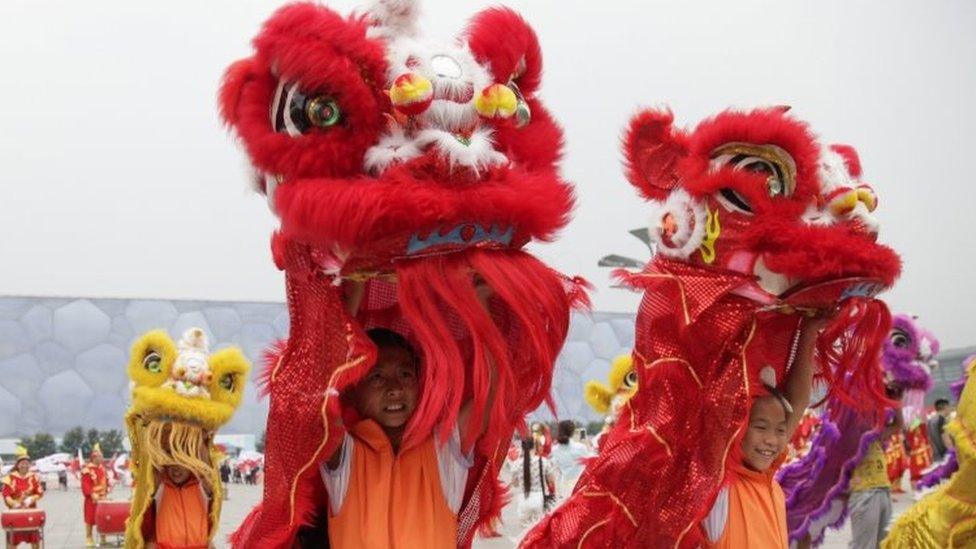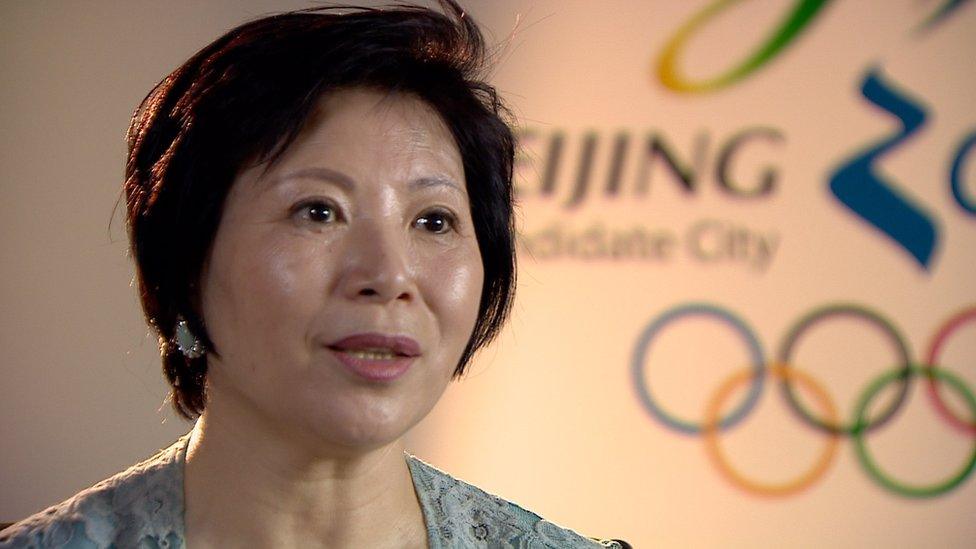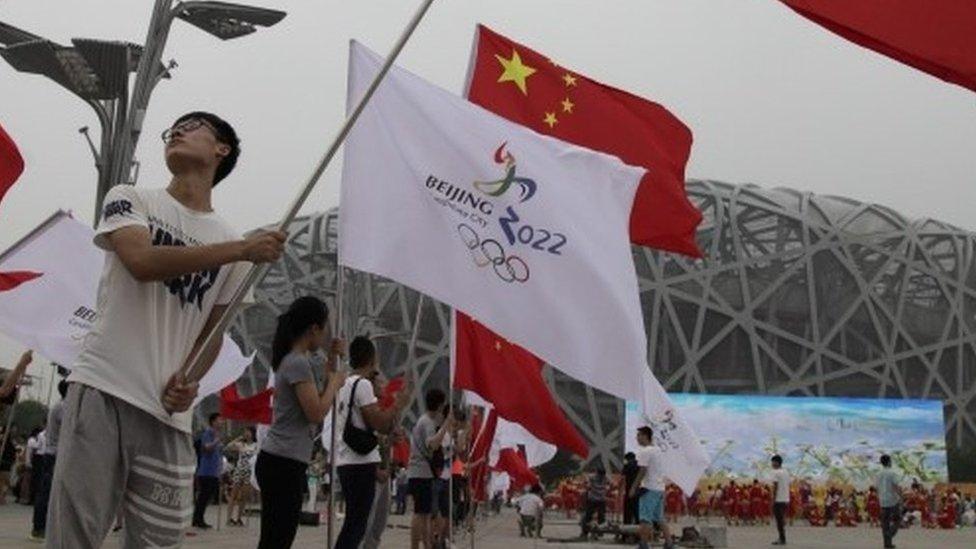2022 Winter Olympics: Sensitivity and suspicion mark China ambitions
- Published

John Sudworth (right) challenged one of the drivers of the mysterious cars that followed the BBC crew
Beijing has beaten Almaty in Kazakhstan to become the host for the 2022 Winter Olympic Games. The International Olympic Committee said both bids had much to offer. But critics claimed it was an unpalatable choice between two undemocratic countries with questionable human rights records. Ahead of the announcement, the BBC's John Sudworth visited one of the proposed ski resorts - and encountered more than expected.
It was a welcome hardly in keeping with the Olympic ideal of "openness".
The three mysterious black cars with tinted windows followed our every move around the ski resort of Chongli, 240km (149 miles) north-west of Beijing.
In fact, they had begun tailing us long before our arrival, seemingly aware we were coming.
They stayed close behind us on the drive up the mountain, lurking nearby while we stopped to chat to the engineers installing the brand new ski-lifts.
When we drove back down again through the local town festooned with Beijing 2022 placards and banners, so did they.
And so it went on all day. When we pulled over, they pulled over. And when we drove on, they were never far behind.
There they were, parked just a little way up the road while we filmed the construction teams resurfacing the road.
And was that their front wheels poking out from the alleyway across from the restaurant where we stopped for lunch?
Yes, it was.
'No problem'
Of course, this kind of scrutiny of foreign journalists in China is not unusual.

Beijing is hoping for good news when the announcement is made later on Friday
But it is, nowadays, normally reserved for the most politically sensitive of stories, not - you might think - a routine trip to examine a ski resort.
Beijing is acutely aware that there are strong criticisms of its bid to host the 2022 Winter Olympics.
One of the controversies surrounds the issue of water and the view that a Winter Olympic bid so heavily dependent on artificially produced snow is not such a good idea in a region already struggling with a serious drought.
State media have, of course, been working overtime to dispel and denounce any such concern.
"Surveys indicate that over 90% of the residents in Beijing and Zhangjiakou support the bid," reads one article on the official bid website.
"Some did express opposing ideas on the internet," it graciously admits before going on to call those ideas "mostly clichés about wasting money or exhausting the people".
And as for that water shortage? No problem, say the authorities.
There's more precipitation than you think, our winters are getting wetter and anyway, what we don't have we can pipe in.
Human rights concern
For Beijing the games would bring real development opportunities not just to resorts like Chongli, but to the wider province of Hebei that has always lagged behind the country's capital.

Beijing's bid official Wang Hui said the Winter Olympics in the city "are exactly meeting people's needs"
The planned infrastructure upgrades include a new high speed rail link to Zhangjiakou, the closest city to Chongli, which would cut the journey time to Beijing from well over three hours at present to less than an hour.
In fact, when asked about the other major area of concern surrounding Beijing's bid - the issue of human rights - it is telling that the senior official put up to speak to the BBC begins her answer in terms of the economic and lifestyle benefits the games will bring.
"On the subject of human rights," Wang Hui, the Bid Committee deputy secretary says, "the Winter Olympics are exactly meeting people's needs."
"Let's take a look at the example in Zhangjiakou," she goes on. "Ski resorts there attracted one million visitors in 2013; in 2014, that figure was raised to 3.5 million. These people are accumulating wealth and they are looking for a healthier lifestyle."
Mistrust
But, of course, China knows it needs to promise more than that to secure an Olympic games - just as it had to before the 2008 Summer Olympics, and that is where the concern comes in.
Despite the assurances that those games would be a force for change, seven years on many observers say that China's restrictions on freedom of expression, access to the internet and the rights of protest and dissent have grown heavier.

China's human rights record is once again in the spotlight
But China is making the same promises again.
"If we could win the bid of Beijing 2022, we will faithfully and strictly follow the rules and regulations set forth by the IOC in terms of human rights protections," Wang Hui says.
Which brings me back to our somewhat intimidating escort through Chongli, a resort that will play an important part in the 2022 Winter Olympics, hosting the snowboarding, freestyle skiing and biathlon events among others.
We have no idea, of course, who the men in the cars were or on whose authority they were acting.
Their presence may simply be a sign of an over anxious local security department with too much time on its hands.
But it could also be argued that it is a hint of something deeper - a mistrust of the very rights and freedoms that Beijing is promising it will uphold.
Walking over to one of the parked cars I knock on the window, the driver opens the door, and I ask if he'd mind telling me who he is and why he's following us.
"I'm not," he insists.
When I point out that he's been tailing us almost all the way from Beijing he denies it once more. "I'm just waiting for a friend," he says.
But as we drive off, he's there behind us again.
- Attribution
- Published2 October 2014